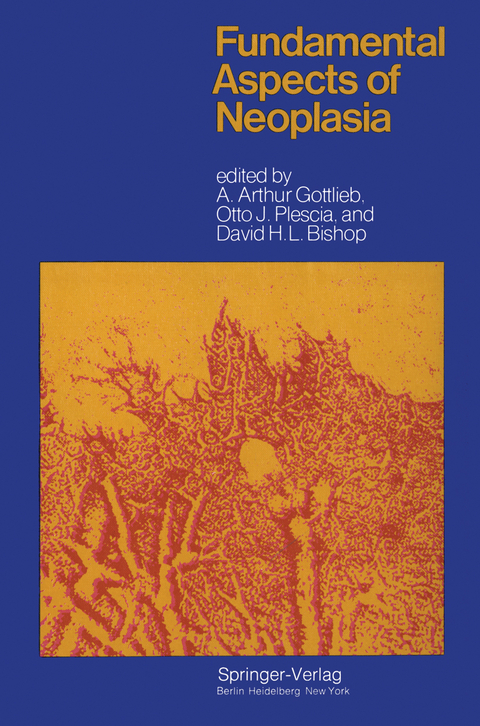
Fundamental Aspects of Neoplasia
Springer Berlin (Verlag)
978-3-642-66114-3 (ISBN)
The control of cancer is at once a major public health problem and a problem of fundamental biologic interest. As a result of technologic developments and new insights in the realm of molecular biology, new and important approaches to an understanding of neoplasia are now possible. Several aspects of neoplasia are clearly of microbiologic interest, including the role of viruses in the etiology of cancer, control of the immune response to tumor cells, and the susceptibility of tumor-bearing hosts to overwhelming infection as a result of immuno deficiency. Recent advances in these areas led us to organize this symposium, and, through this publication, to record some of the progress being made in laboratories around the world in understanding some of the basic aspects of the cancer problem. This symposium was held as part of the commemoration of the twentieth anniversary of the Waksman Institute of Microbiology. Dr. Waksman's devo tion to the study of the smallest forms of life and the commitment of the Waksman Institute to the free pursuit of knowledge are the underpinnings of the institute's research eHorts in the broad area of microbiology, including the problem of neoplasia. It is of interest to note that actinomycin, one of the earliest antibiotics discovered in Waksman's laboratory, was also one of the first compounds found to be clinically useful in the treatment of certain types of cancer.
I Biology of Tumor Viruses.- 1 On the Evidence of Type-C RNA Tumor Information and Virus-Related Reverse Transcriptase in Animals and in Human Leukemia Cells.- 2 Evolution of Primate Type-C Viral Genes.- 3 The Mammary Tumor Viruses.- 4 Biochemical Evidence for Viral Involvement in Human Breast Cancer.- II Tumor Immunology.- 5 Immunologic Properties of Cell Surface Antigens Induced by RNA Tumor Viruses.- 6 Studies on the Mechanisms of Tumor Immunity: Some Recent Data on Cellular Immunity to Common, Possibly Embryonic Antigens in Mouse Sarcomas.- 7 Escape from Immune Control by the Shedding of Membrane Antigens: Influence on Metastic Behavior of Tumor Cells.- 8 Expression of HL-A Antigens on Lymphoblastoid Cells.- 9 Inhibitory Action of Poly A:Poly U on Tumor Growth and Enhancement of Host Immune Response.- 10 The Problem of Cancer Immunotherapy in Perspective.- III Clinical Aspects.- 11 Immunotherapy of Cancer: Concepts and Problems.- 12 Chemotherapy, Supportive Care, and Immunotherapy of Cancer-From Research Tools to Therapeutic Modalities.- 13 Immunologic and Clinical Responses to Active Immunotherapy of Malignant Melanoma.- 14 Viral Etiology of Human Osteosarcoma: Evidence Based on Response to Tumor-Specific Transfer Factor and on Immuno-epidemiologic Studies.- 15 Evidence for RNA Virus Associated with Human Transitional Cell Cancers of the Urinary Tract.- 16 Trials with Poly A:Poly U as Adjuvant Therapy Complementing Surgery in Randomized Patients with Breast Cancer.- IV DNA Polymerases of Malignant Cells and Associated Viruses.- 17 Endogenous RNA Synthesis Is Required for Endogenous DNA Synthesis by Reticuloendotheleosis Virus Virions.- 18 On Mutagenic DNA Polymerases and Malignancy.- 19 Properties and Origin of the Subunits of Reverse Transcriptase Isolated fromAvian RNA Tumor Viruses.- 20 An Inhibitor of DNA Polymerase Produced by Tumor Cells.- V Viral Expression and Cell Transformation.- 21 In Vitro Transcription Studies with RNA Tumor Viruses.- 22 Synthesis of Viral DNA and Transcription of Viral RNA during Infection and Cell Transformation by the Murine Sarcoma-Leukemia Virus.- 23 Characteristics of Cells Transformed by Rous Sarcoma Virus.- 24 Synthesis and Integration of Rous Sarcoma Virus Proviral DNA on Duck Embryo Fibroblast Cells.- 25 Control of the Epstein-Barr Virus Genome by Mammalian Cells.- 26 The Regulation of Deoxypyrimidine Kinases in Normal Transformed, and Infected Mouse Cells in Culture.- VI Tumor Cell Growth and Regulation.- 27 Studies on the Cellular Mechanisms of Chemical Oncogenesis in Culture.- 28 Growth Control and the Mitotic Cell Surface.- 29 Changes in Cytoplasmic Poly (A)-Rich RNA in WI-38 Cells Stimulated to Proliferate.- 30 Growth Regulation of Human Acute Leukemia Cell Populations.- 31 Tumor Angiogenesis: Effect on Tumor Growth and Immunity.- Epilogue: On the Planning of Science.
| Erscheint lt. Verlag | 15.11.2011 |
|---|---|
| Zusatzinfo | XXIV, 424 p. |
| Verlagsort | Berlin |
| Sprache | englisch |
| Maße | 170 x 244 mm |
| Gewicht | 773 g |
| Themenwelt | Medizin / Pharmazie ► Medizinische Fachgebiete ► Dermatologie |
| Medizin / Pharmazie ► Medizinische Fachgebiete ► Onkologie | |
| Schlagworte | Antibiotics • Cancer • Immunologie • Immunotherapie • Infection • Krebs • Molecular Biology • therapy • Tumor • Viruskrankheit |
| ISBN-10 | 3-642-66114-9 / 3642661149 |
| ISBN-13 | 978-3-642-66114-3 / 9783642661143 |
| Zustand | Neuware |
| Haben Sie eine Frage zum Produkt? |
aus dem Bereich


